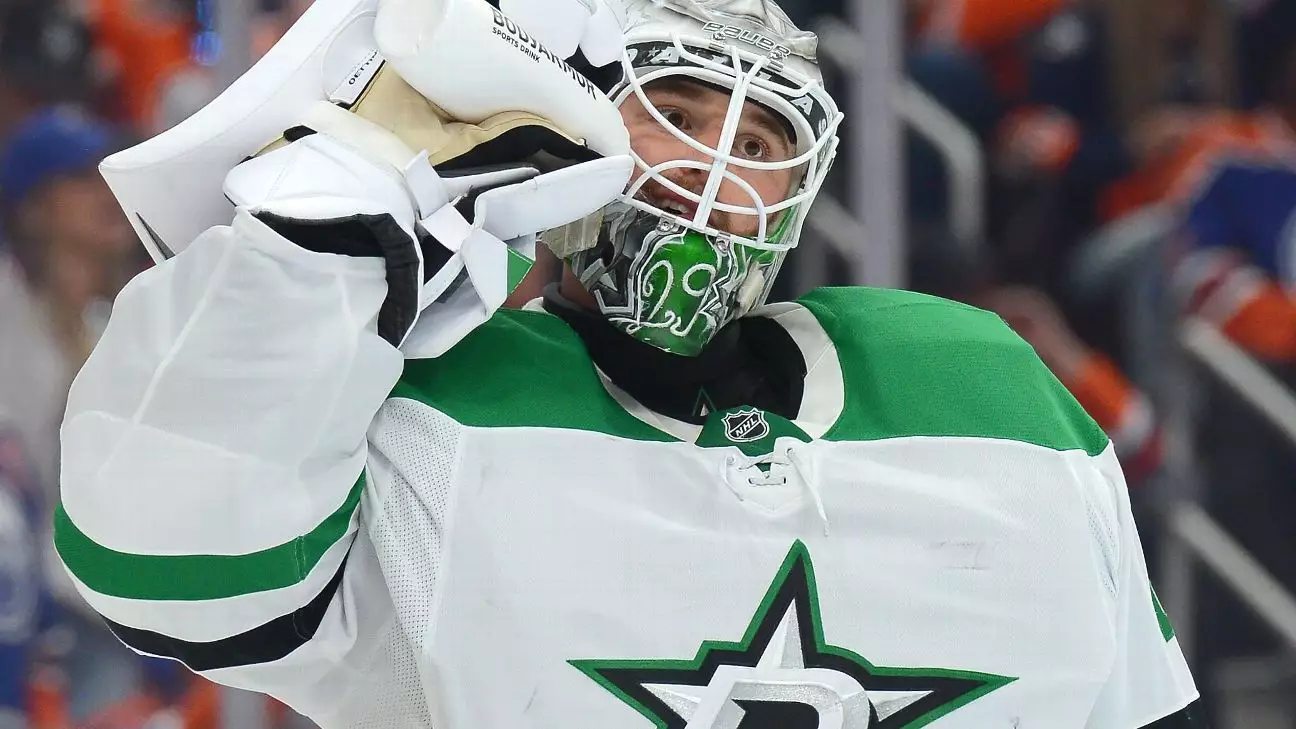In the unforgiving realm of professional sports, decisions are often made under immense pressure, and few choices can be as contentious as that of a playoff goaltender’s performance. This past Saturday, Dallas Stars goaltender Jake Oettinger faced an unexpected turn of events that left both him and his coach, Peter DeBoer, at a crossroads after Game 5 of the Western Conference finals. Surprised and embarrassed, Oettinger was pulled from the game after conceding two goals on the first two shots he faced, igniting a firestorm of questions and scrutiny concerning the choice to bench one of the league’s most promising young talents.
DeBoer’s rationale dwells in the heart of competition—survival is the name of the game. The coach stressed the importance of making tactical decisions to keep playoff hopes alive, stating, “There’s one motive, and that’s how do we survive this and get it to a Game 6.” But the emotional weight of such choices can be heavy on both players and coaches, especially when the results fall short of expectations.
Tomorrows That Never Came
Instead of advancing to Edmonton for what could have been a critical Game 6, the Stars faced an abrupt end to their season, reflecting the hardships of a campaign that saw them reach the Western Conference finals for the third year in a row, only to bow out. With the scoreboard revealing a 6-3 defeat, the unthinkable reality of “what could have been” loomed over the Dallas locker room. Oettinger himself acknowledged that one or two successful saves could have drastically altered the outcome—“The reality is if I make one or two of those saves, then I’m still playing,” he remarked in his first comments post-benching.
Such statements underline the vulnerability and psychological burden on goaltenders. At the heart of every save is the potential to flip the script; yet the margins in playoff hockey are razor-thin. Oettinger’s path to the present was paved with experience, but the agony of being benched in a pivotal match would haunt even the strongest of players.
A Goaltender’s Road: The Burden of Expectations
Coming to terms with failure is an intrinsic part of growth in sports, particularly for a player—like Oettinger—who viewed himself as among the best when performing at his peak. Across four consecutive playoff seasons, Oettinger has shown remarkable resilience and skill, but even elite players have their off nights. He took the moment in stride, reflecting on how it offers a lesson in humility and self-assessment. Oettinger’s journey in the playoffs has seen him accumulate an impressive save percentage and navigate the volatility of playoff hockey, yet this latest experience poses a new challenge: maturing from disappointment.
As he reflected on his performance, Oettinger did not merely bemoan the loss; instead, he framed it as a stepping stone—a necessary pit stop on the road to improvement. “My job is to stop the puck. And I feel like I’m one of the best in the world… All the extra stuff is just extra stuff to me,” he asserted, emphasizing his singular focus on honing his craft.
Coaching Dilemmas and Player Dynamics
Coaches bear the dual responsibility of nurturing talent while making difficult decisions, and DeBoer’s struggle was palpable. He expressed loyalty and admiration for Oettinger but still had to confront the harsh realities that come with playoff hockey, where even a fleeting hint of fatigue or vulnerability can result in catastrophic consequences. DeBoer’s explanation hinted at the quieter battles within the game—where a player’s physical state intertwines with their mental fortitude, and decisions are made in an attempt to salvage a team’s season.
The conversation surrounding Oettinger doesn’t end with his performance; it opens the floor to discussions about relationships between players and their coaches. When asked about any concerns regarding their dynamic, Oettinger asserted a determination to foster growth rather than harbor resentment. He estimates that experiences like these will contribute to his development, both as an athlete and an individual.
Gripping Future Aspirations
As the uncertainty of the offseason looms, one thing is made clear: Jake Oettinger possesses a mature understanding of the professional landscape. His unwavering commitment to improve and desire to become a more formidable presence is echoed by his rejection of the day-to-day distractions that typically plague players in high-stakes environments. Instead, his focus remains laser-sharp on the objective at hand—elevating his performance and adapting his strategies for the coming seasons.
The emotional scars of a tough playoff loss can be an athlete’s greatest teacher, and while Dallas fans may be left mourning a lost opportunity, Oettinger’s journey promises to be one of resilience and relentless pursuit of excellence.


Leave a Reply